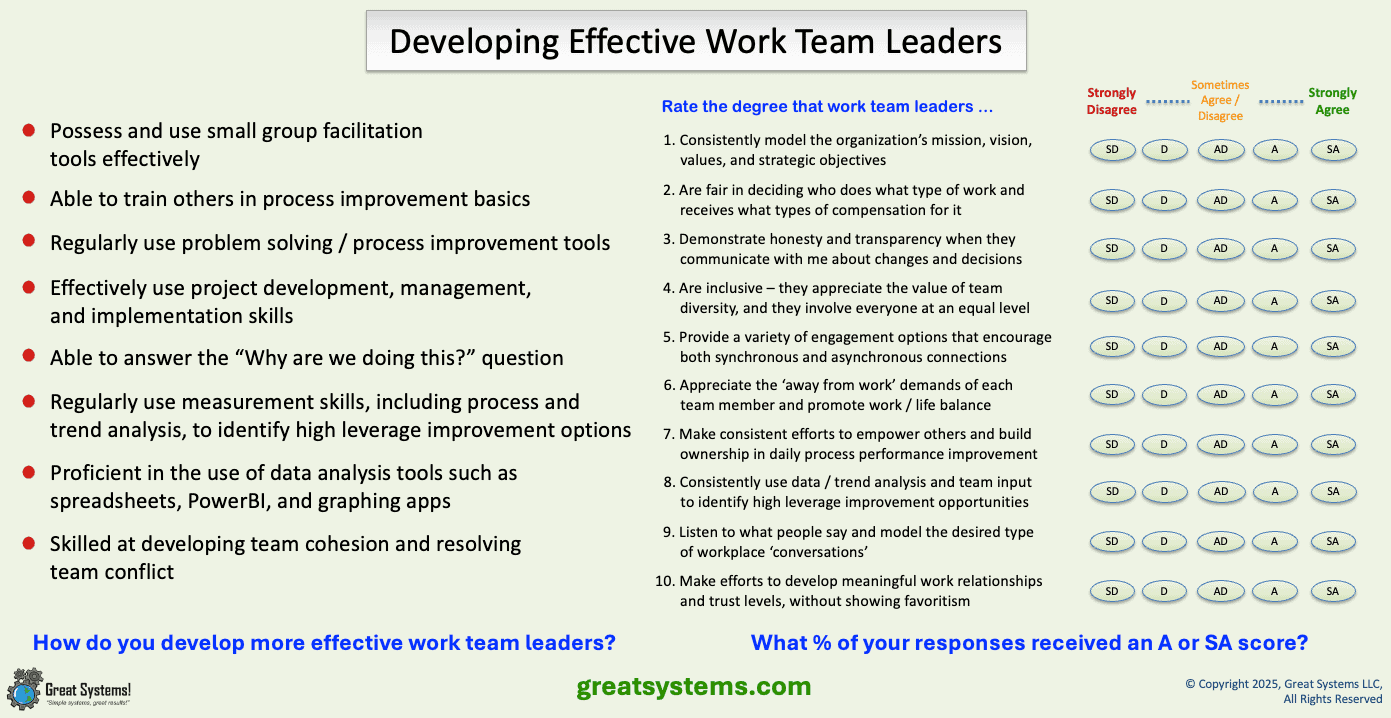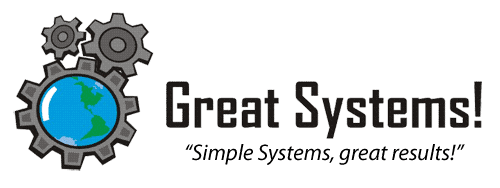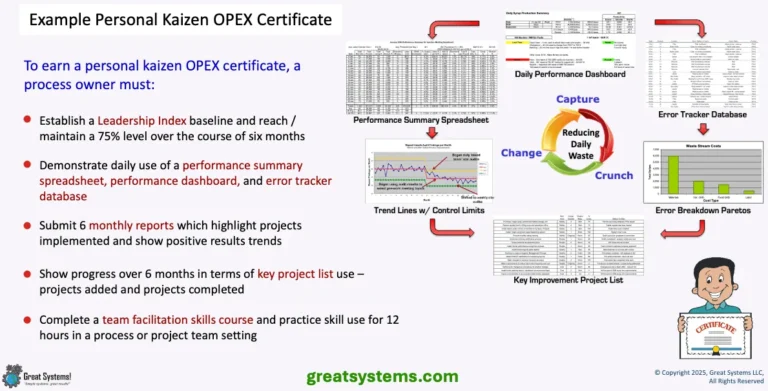How to Develop Effective Work Team Leaders

How to Develop Effective Work Team Leaders
Changes seem to impact our work team chemistry and process requirements almost daily. Developing effective work team leaders has been a goal of most organizations for years.
There was never near as much of a need for someone to 'command and control' as there was for someone who was an effective coach and process optimizer. That is the type of leader our NextGen workforce demands today and in the future.
In recent years, technology and automation have further reduced the need for manual labor in the workplace. These changes heighten the need for knowledge workers.
Unfortunately, the people who enter today's workforce are even less prepared to supervise others than they were years ago. Even more unfortunate is the fact that effective work team leaders are the key to daily kaizen work habits and operational excellence.
There was never near as much of a need for someone to 'command and control' as there was for someone who was an effective coach and process optimizer. That is the type of leader our NextGen workforce demands today and in the future.
In recent years, technology and automation have further reduced the need for manual labor in the workplace. These changes heighten the need for knowledge workers.
Unfortunately, the people who enter today's workforce are even less prepared to supervise others than they were years ago. Even more unfortunate is the fact that effective work team leaders are the key to daily kaizen work habits and operational excellence.
How Do You Develop Effective Work Team Leaders?
How do you develop effective work team leaders? Here are four key steps to help make this happen.
First, clearly define behavior and task expectations from a process ownership perspective. Second, require the use of a daily process performance tracking process that helps measure performance to those expectations.
Third, work with each work team leader, and their work team, to find key gaps and possible root causes. Finally, make the necessary changes to close those key gaps.
Typically, process improvement responsibilities are placed in the hands of safety professionals, the Quality department, or the Engineering group. Also, we may ask our work team leaders and process owners to perform in this capacity.
However, their job designs rarely support a consistent, meaningful level of process improvement work. Additionally, time rarely exists in their current job designs to allow for this work.
Many work team leaders don't have the skills they need to manage projects, use process improvement tools, and facilitate team-based improvement efforts. The number of your leaders that possess these skills may be small as well.
Unfortunately, if you choose to limit your process improvement efforts to only a small percentage of your workforce, your progress towards operational excellence will take quite some time.
First, clearly define behavior and task expectations from a process ownership perspective. Second, require the use of a daily process performance tracking process that helps measure performance to those expectations.
Third, work with each work team leader, and their work team, to find key gaps and possible root causes. Finally, make the necessary changes to close those key gaps.
Typically, process improvement responsibilities are placed in the hands of safety professionals, the Quality department, or the Engineering group. Also, we may ask our work team leaders and process owners to perform in this capacity.
However, their job designs rarely support a consistent, meaningful level of process improvement work. Additionally, time rarely exists in their current job designs to allow for this work.
Many work team leaders don't have the skills they need to manage projects, use process improvement tools, and facilitate team-based improvement efforts. The number of your leaders that possess these skills may be small as well.
Unfortunately, if you choose to limit your process improvement efforts to only a small percentage of your workforce, your progress towards operational excellence will take quite some time.
If I could suggest one change to significantly increase the likelihood that your performance improvement initiative would succeed, what would it be? After much research and reflection, I can finally provide that answer after giving the question much thought as it related to my own past successes, failures, and learnings.
WATCH over 50 kaizen and workplace health improvement videos on my Great Systems YouTube channel.
WATCH over 50 kaizen and workplace health improvement videos on my Great Systems YouTube channel.
Who has the Most Influence Over Your Workforce?
Work team leaders are the key to high performance. However, they can only be effective in that role if they know how to develop people and work with others to help improve systems.
Why are work team leaders so important? To find the answer, simply ask "Who spends more time with the highest percentage of your workforce than anyone else?"
If that question does not convince you, ask a second question. Who do employees really get their perception of what the organization wants to accomplish from? You can have the most charismatic and influential leaders at the top of your organization and still fail to make significant progress towards process excellence.
One or two people can rarely affect significant behavior change when they only spend two or three hours with people each year. Work team leaders see their people every day.
Each day, each leader intentionally and unintentionally sends strong message to their people about what is important and what is not. The question is "How often do they send the RIGHT messages?"
Why are work team leaders so important? To find the answer, simply ask "Who spends more time with the highest percentage of your workforce than anyone else?"
If that question does not convince you, ask a second question. Who do employees really get their perception of what the organization wants to accomplish from? You can have the most charismatic and influential leaders at the top of your organization and still fail to make significant progress towards process excellence.
One or two people can rarely affect significant behavior change when they only spend two or three hours with people each year. Work team leaders see their people every day.
Each day, each leader intentionally and unintentionally sends strong message to their people about what is important and what is not. The question is "How often do they send the RIGHT messages?"
What Skills Do Effective Work Team Leaders Need to Have?
Effective work team leaders need 'hard' skills to improve systems. They also need 'soft' skills' to effectively coach others. Few people are taught these skills as part of their formal education however, and most supervisory job designs do not encourage their use.
Think about it. How much time do the supervisors you know spend to process paperwork, do other clerical duties, and serve as a 'gofer'? How much time do they invest to coach, analyze process performance, and develop improvement projects?
To succeed in a high-performance workplace, an effective work team leader needs to develop and regularly use the following skills:
Daily Behavior Skills
• Take initiative to improve performance
• Respect and promote diversity
• Communicate expectations
• Seek first to understand
• Provide performance feedback
• Resolve conflict and build teams
• Utilize change and innovate
Daily Task-Based Skills
• Graph creation and analysis
• Spreadsheet and database use
• Develop and implement improvement projects
• Process analysis and design
• Identify cost reduction opportunities
• Facilitate and lead team meetings
• Create performance improvement plans
Think about it. How much time do the supervisors you know spend to process paperwork, do other clerical duties, and serve as a 'gofer'? How much time do they invest to coach, analyze process performance, and develop improvement projects?
To succeed in a high-performance workplace, an effective work team leader needs to develop and regularly use the following skills:
Daily Behavior Skills
• Take initiative to improve performance
• Respect and promote diversity
• Communicate expectations
• Seek first to understand
• Provide performance feedback
• Resolve conflict and build teams
• Utilize change and innovate
Daily Task-Based Skills
• Graph creation and analysis
• Spreadsheet and database use
• Develop and implement improvement projects
• Process analysis and design
• Identify cost reduction opportunities
• Facilitate and lead team meetings
• Create performance improvement plans
How Do You Teach Work Team Leaders These Skills?
Most high-performance skills require practice for true learning to occur. One needs repeat practice to improve at golf, or to make more free throws. Work team leaders need to practice how they use improvement tools, coach others, and develop projects. In a Great Systems virtual workshop, work team leaders practice while they learn.
When we focus only on the key concepts that we need to learn, we can minimize the use of lecture in favor of skill practice. My Great Systems Personal Kaizen Operational Excellence Certificate Process requires work team leaders to provide evidence of success.
How do they personally use process improvement tools to make changes that last? How do they successfully work with their team to put improvements in place? Can your work team leaders prove that they consistently make changes that matter?
In a practice-based learning space, work team leaders practice tool use in a team environment that mirrors the one they have at work. Both their peers and the instructor give them consistent feedback on their performance. They complete a workbook to summarize their key learnings. This workbook also provides additional practice exercises that they can use back at work.
In my workshops, work team leaders create an action plan for further improvement. They also create a new design for their job. The goal is to find time for high performance work practices. Finally, they receive three months of free online coaching from the instructor as they put their action plans to work. A certificate test supplements the completion of the learning plan itself.
When we focus only on the key concepts that we need to learn, we can minimize the use of lecture in favor of skill practice. My Great Systems Personal Kaizen Operational Excellence Certificate Process requires work team leaders to provide evidence of success.
How do they personally use process improvement tools to make changes that last? How do they successfully work with their team to put improvements in place? Can your work team leaders prove that they consistently make changes that matter?
In a practice-based learning space, work team leaders practice tool use in a team environment that mirrors the one they have at work. Both their peers and the instructor give them consistent feedback on their performance. They complete a workbook to summarize their key learnings. This workbook also provides additional practice exercises that they can use back at work.
In my workshops, work team leaders create an action plan for further improvement. They also create a new design for their job. The goal is to find time for high performance work practices. Finally, they receive three months of free online coaching from the instructor as they put their action plans to work. A certificate test supplements the completion of the learning plan itself.
How Did I Develop My High-Performance Leadership Perspective?
For almost 30 years, I have both served as a trainer for work team leaders and formally been responsible for their development. I have learned the hard way about what works and what does not when it comes to work leader training.
Most importantly, I can both empathize with the daily challenges that a team leader faces on the front lines and push them towards higher levels of performance. I have helped over 200 front line leaders improve their performance at work to-date. I am very proud of some of my success stories.
Additionally, I have seen the downside of what happens when you simply send work team leaders to a two or three day "skills development" workshop and ask them to change. This approach, simply put, will not work!
To get consistent and effective tool use, you have to do two things. First, you must require each supervisor to demonstrate tool use over time and develop new habits. Second, each work team leader must redesign their jobs to create time for tool practice and use.
In other words, one must require proven change. You must provide time to help make that change happen, and coach them as they practice. People need help to learn those skills that they did not receive through their formal education.
Most importantly, I can both empathize with the daily challenges that a team leader faces on the front lines and push them towards higher levels of performance. I have helped over 200 front line leaders improve their performance at work to-date. I am very proud of some of my success stories.
Additionally, I have seen the downside of what happens when you simply send work team leaders to a two or three day "skills development" workshop and ask them to change. This approach, simply put, will not work!
To get consistent and effective tool use, you have to do two things. First, you must require each supervisor to demonstrate tool use over time and develop new habits. Second, each work team leader must redesign their jobs to create time for tool practice and use.
In other words, one must require proven change. You must provide time to help make that change happen, and coach them as they practice. People need help to learn those skills that they did not receive through their formal education.
What is the Most Critical Factor to Sustain an Improvement Effort?
This is a tough question, because I am torn between two possible answers. An improvement initiative will not succeed if leaders fail to allocate time towards it.
Such time, if allocated, also must be used effectively. Many organizations allocate such time on paper (in a strategic plan, job description, or expense budget for example).
Unfortunately, they fail to require EACH leader to show how they personally use this time to improve the key processes they own. If I could only change one thing, I would change what I expect from each of my leaders.
Most people will find a way to reach a goal if a leader clearly states that goal, along with meaningful consequences for failing to achieve that goal.
As a first step, use a balanced set of metrics to track leadership behavior and task effectiveness. Provide a ‘bottom up’ Leadership Index to each work team leader at least once a year as a behavior effectiveness metric.
Plus, hold your process owners responsible for their own safety, cost, quality, and people metrics. Each process they own produces a VARIETY of key measures over time. Evidence of improvement includes key performance indicator (KPI) trend lines and balanced scorecards.
Next, I expect each of my work team leaders to provide a monthly update. This update includes a key project list for their processes and a monthly summary of their key accomplishments and challenges.
A performance summary spreadsheet that shows DAILY process inputs and outputs is also part of the monthly package. Each work team leader is expected to spend 30-60 minutes a day on these items.
Ideally, each leader uses a spreadsheet to compile and organize this work. A simple look at the spreadsheet allows others to review their progress at any time.
Finally, each leader posts results trend lines in their process areas, and/or in their hard copy monthly report (or intranet web page). These requirements are built into my "Personal Kaizen Operational Excellence" certificate process.
Such time, if allocated, also must be used effectively. Many organizations allocate such time on paper (in a strategic plan, job description, or expense budget for example).
Unfortunately, they fail to require EACH leader to show how they personally use this time to improve the key processes they own. If I could only change one thing, I would change what I expect from each of my leaders.
Most people will find a way to reach a goal if a leader clearly states that goal, along with meaningful consequences for failing to achieve that goal.
As a first step, use a balanced set of metrics to track leadership behavior and task effectiveness. Provide a ‘bottom up’ Leadership Index to each work team leader at least once a year as a behavior effectiveness metric.
Plus, hold your process owners responsible for their own safety, cost, quality, and people metrics. Each process they own produces a VARIETY of key measures over time. Evidence of improvement includes key performance indicator (KPI) trend lines and balanced scorecards.
Next, I expect each of my work team leaders to provide a monthly update. This update includes a key project list for their processes and a monthly summary of their key accomplishments and challenges.
A performance summary spreadsheet that shows DAILY process inputs and outputs is also part of the monthly package. Each work team leader is expected to spend 30-60 minutes a day on these items.
Ideally, each leader uses a spreadsheet to compile and organize this work. A simple look at the spreadsheet allows others to review their progress at any time.
Finally, each leader posts results trend lines in their process areas, and/or in their hard copy monthly report (or intranet web page). These requirements are built into my "Personal Kaizen Operational Excellence" certificate process.
More Content with a Total Team Engagement Focus:
Would You Like to Learn More About Effective Work Team Leader Development?
You can use the workbooks, workshops, and articles I offer on this site to (1) develop effective work teams, (2) design excellent work processes, and (3) sustain better results. There is no need for you to spend a lot of money or time. I truly believe that an organization cannot attain such goals without a team of great work team leaders.
There are two ways I can help you develop more effective work team leaders. First, I can facilitate virtual work team leader development workshops. Second, I can also serve as an 'on the job' performance improvement coach. Send me an e-mail if you would like to learn more.
About Kevin and Great Systems
Continuous Improvement and OPEX Coaching
Ask Questions or Request Assistance
There are two ways I can help you develop more effective work team leaders. First, I can facilitate virtual work team leader development workshops. Second, I can also serve as an 'on the job' performance improvement coach. Send me an e-mail if you would like to learn more.
About Kevin and Great Systems
Continuous Improvement and OPEX Coaching
Ask Questions or Request Assistance


